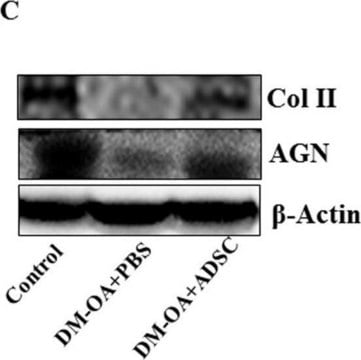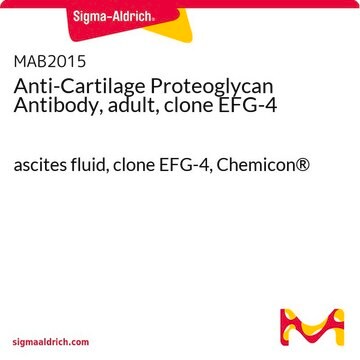ZRB1117
Anti-Aggrecan Antibody, clone 4B10 ZooMAb® Rabbit Monoclonal

recombinant, expressed in HEK 293 cells
Sinónimos:
CSPCP, Cartilage-specific proteoglycan core protein, Chondroitin sulfate proteoglycan 1, Chondroitin sulfate proteoglycan core protein 1
About This Item
Productos recomendados
biological source
rabbit
Quality Level
recombinant
expressed in HEK 293 cells
conjugate
unconjugated
antibody form
purified antibody
clone
recombinant monoclonal
product line
ZooMAb® learn more
form
lyophilized
mol wt
calculated mol wt 261.33 kDa
observed mol wt ~300 kDa
species reactivity
human
species reactivity (predicted by homology)
monkey
packaging
antibody small pack of 25 μL
greener alternative product characteristics
Waste Prevention
Designing Safer Chemicals
Design for Energy Efficiency
Learn more about the Principles of Green Chemistry.
enhanced validation
recombinant expression
Learn more about Antibody Enhanced Validation
sustainability
Greener Alternative Product
technique(s)
affinity binding assay: suitable
immunocytochemistry: suitable
immunohistochemistry (formalin-fixed, paraffin-embedded sections): suitable
western blot: suitable
isotype
IgG
UniProt accession no.
greener alternative category
shipped in
ambient
storage temp.
2-8°C
target post-translational modification
unmodified
General description
Each ZooMAb antibody is manufactured using our proprietary recombinant expression system, purified to homogeneity, and precisely dispensed to produce robust and highly reproducible lot-to-lot consistency. Only top-performing clones are released for use by researchers. Each antibody is validated for high specificity and affinity across multiple applications, including its most commonly used application. ZooMAb antibodies are reliably available and ready to ship when you need them.
Learn more about ZooMAb here.
Specificity
Immunogen
Application
Western Blotting Analysis: A 1:1,000 dilution of this antibody detected Aggrecan in Human Chondrocytes.Tested applicationsWestern Blotting Analysis: A 1:1,000 dilution from a representative lot detected Aggrecan in Human Mesenchymal Stem Cells.Affinity Binding Assay: A representative lot of this antibody bound Aggrecan peptide with a KD of 2.4 x 10-8 in an affinity binding assay.Immunohistochemistry (Paraffin) Analysis: A 1:100 dilution from a representative lot detected Aggrecan in human cartilage tissue sections.Immunocytochemistry Analysis: A 1:100 dilution from a representative lot detected Aggrecan in human chondrocytes.Note: Actual optimal working dilutions must be determined by end user as specimens, and experimental conditions may vary with the end user.
Target description
Physical form
Reconstitution
Storage and Stability
Legal Information
Disclaimer
Storage Class
11 - Combustible Solids
wgk_germany
WGK 1
flash_point_f
Not applicable
flash_point_c
Not applicable
Certificados de análisis (COA)
Busque Certificados de análisis (COA) introduciendo el número de lote del producto. Los números de lote se encuentran en la etiqueta del producto después de las palabras «Lot» o «Batch»
¿Ya tiene este producto?
Encuentre la documentación para los productos que ha comprado recientemente en la Biblioteca de documentos.
Nuestro equipo de científicos tiene experiencia en todas las áreas de investigación: Ciencias de la vida, Ciencia de los materiales, Síntesis química, Cromatografía, Analítica y muchas otras.
Póngase en contacto con el Servicio técnico





